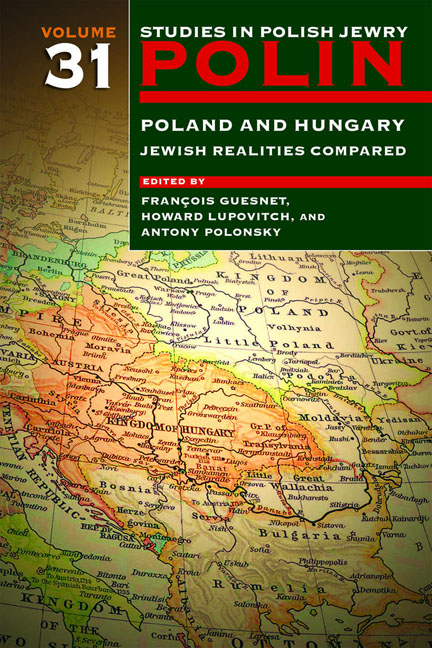Book contents
- Frontmatter
- Dedication
- Editors and Advisers
- Preface
- Polin
- Polin: Studies in Polish Jewry
- Contents
- Note on Place Names
- Note on Transliteration
- Part I POLAND AND HUNGARY: JEWISH REALITIES COMPARED
- JEWISH ACCULTURATION AND INTEGRATION
- JEWISH RELIGIOUS LIFE
- JEWS IN POPULAR CULTURE
- THE INTERWAR YEARS
- THE HOLOCAUST AND ITS AFTERMATH
- PERSONAL REFLECTIONS
- Part II NEW VIEWS
- Part III OBITUARIES
- Notes on the Contributors
- Index
Gender and Scholarship in the Goldziher Household: Jewish Men and Women in Late Nineteenthand Early Twentieth-Century Hungarian Academia
- Frontmatter
- Dedication
- Editors and Advisers
- Preface
- Polin
- Polin: Studies in Polish Jewry
- Contents
- Note on Place Names
- Note on Transliteration
- Part I POLAND AND HUNGARY: JEWISH REALITIES COMPARED
- JEWISH ACCULTURATION AND INTEGRATION
- JEWISH RELIGIOUS LIFE
- JEWS IN POPULAR CULTURE
- THE INTERWAR YEARS
- THE HOLOCAUST AND ITS AFTERMATH
- PERSONAL REFLECTIONS
- Part II NEW VIEWS
- Part III OBITUARIES
- Notes on the Contributors
- Index
Summary
THE DEDICATION in any academic book is an important tool in the hands of the author. It allows for an expression of gratitude to predecessors, colleagues, and family and friends for scholarly or other support and inspiration. The worldrenowned orientalist Ignác (Ignaz) Goldziher (1850–1921) used this tool often. By dedicating his books to his mentors and colleagues, he paid due respect to fellow scholars and consequently defined the intellectual community with which he identified. His last monograph, Schools of Koranic Commentators, published in 1920, however, commemorates his young deceased daughter-in-law Mária Freudenberg (1890–1918). He wrote: ‘Dem teuern Andenken meiner ihren Lieben früh entrissenen Schwiegertochter Marie Goldziher geb. Freudenberg (st. 4. December 1918) wehmutvoll geweiht.’ (Dedicated mournfully to my dear, prematurely deceased daughter-in-law Mária Goldziher, née Freudenberg (d. 4 December 1918).) The short dedication reveals Goldziher's pain over the loss of his daughter-in-law, whom he adored. His diary, published over a half century after the monograph, also attests to his affection for her and the suffering that her departure caused.
The dedication's personal tone is unlike those in his other books, yet what makes this dedication truly exceptional and worthy of examination is the failure to mention that Mária Freudenberg was an Egyptologist. Given that Egyptology informed Goldziher's research and that he was among the first professors teaching ancient Egyptian religion at the University of Budapest, this omission is significant—it demonstrates Goldziher's failure to acknowledge his daughter-in-law as a young colleague and fellow scholar, and, as her biographers stress, a pioneer of Egyptology in Hungary.
Unfortunately, because none of her personal papers is known to have survived, it cannot be gauged how Mária Freudenberg felt about her academic career in a field dominated by men that was nevertheless being increasingly populated by women and evolving dynamically due to archaeological excavations, a growing world market for Egyptian antiquities, and advancements in linguistics.6 Nor can it be discerned how she felt about her father-in-law or his attitude toward her academic endeavours. Nothing is known about her world-view, passions, or any mundane details of her life before and after her marriage to Ignác Goldziher's son, Károly (Carl) Goldziher (1881–1955), one of the pioneers of applied mathematics in Hun-gary. She left behind solely her published scholarship.
- Type
- Chapter
- Information
- Polin: Studies in Polish Jewry Volume 31Poland and Hungary: Jewish Realities Compared, pp. 179 - 198Publisher: Liverpool University PressPrint publication year: 2018



